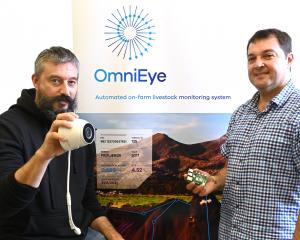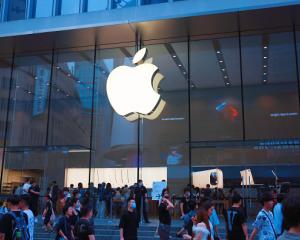Among the items strewn about my geek-inspired desk is a Star Trek communicator replica.
Flip open the little brass gate on the bulky toy made by Diamond Select, and a whirring sound with blinking lights is activated.
It is a pretty sweet prized possession, and sitting next to my black, sleek iPhone 3Gs, it looks like a dinosaur's mobile device.
Of course, as I followed the live feeds at Apple's Worldwide Developers Conference (WWDC) last week, even my phone seemed closer to a fossil-fuel precursor.
As I watched the unveiling of the iPhone 4 yet another sci-fi fanboy fantasy was revealed: the videophone call.
In addition to introducing multitasking, folders, longer battery life, a gyroscope, front and rear cameras with flash, video-editing, and insanely improved image using Retina Display, the new hotness from Steve Jobs will be able to make vid-calls using FaceTime technology.
Granted, the calls are initially limited to Wi-Fi between iPhone 4 devices, but the reveal felt big.
Video calling has been around for some time in certain capacities, but it has never had much of an impact.
Yet this FaceTime development by Apple - which will be open standards and means other carriers can eventually develop around it - does feel like a technological shift.
To hear Mr Jobs tell it, he has wanted this tech to be a reality ever since watching Star Trek and The Jetsons as a boy.
And Greg Joswiak, head of Apple's hardware marketing, said the iPhone 4 was going to change everything, with FaceTime affecting the way we communicate forever.
Forever seems like a bold promise, but a practical, widely accepted videophone will definitely impact on pop culture.
Instead of being limited to science fiction or James Bond superspy flicks, videophone calls on a popular mobile device will affect how characters communicate on screen, and also what counts as fantastical.
Many of my favorite sci-fi gadgets have become a reality.
My Bluetooth earbud is smaller than The Next Generation insignia communicator, and I can easily purchase touchscreen computers and 3-D TVs.
Plus, early workable models of flying cars, underwater cars, androids, ray guns, jetpacks and exoskeletons are being manufactured.
Even Tony Stark's Iron Man suit from my old comics doesn't seem that far off now.
Things that were futuristic and appeared unattainable in pop culture helped unlock the imagination, and even inspired us to aspire to.
Now, there's not much I see in entertainment that blows me away so completely or seems really farfetched.
Despite my insatiable appetite for gizmos, I'm disappointed the gadgetry from childhood has largely been caught up with.
As exciting as the new gadgets are, I can't help but have a twinge of nostalgia for the days when Kirk dramatically flipping open his communicator seemed futuristic.
But at least I still have a few years before the Millennium Falcon is a reality.
I hope












